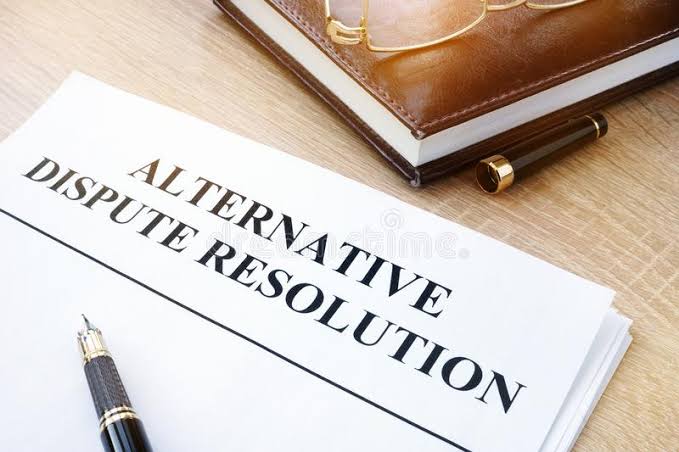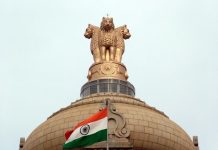This article is written by Saswata Tewari, from University of Petroleum and Energy Studies, Dehradun. This article talks about the alternate dispute resolution mechanisms in the country and the applicability of these mechanisms in various disputes arising out of various sections of our daily lives.
Table of Contents
Introduction
Do you know that India has over 4 crore pending cases in the Supreme Court, High Courts, and various other courts according to the written replies submitted by the Ministry of Law and Justice department in Parliament?
Indian Government has brought out mechanisms like fast track courts for solving the pending cases but even then the problem is far from being solved. If a person approaches a court it cannot be expected to get a speedy trial conferring on the current scenario of the Indian judiciary. Even the fast track court system was not able to perform as per data of the NCRB for 2018, of the around 28,000 trials done in Fast Track Courts across the country in that year, 78% took more than a year to complete and hence puts trial courts at the bottom of the rung in terms of time taken amongst all courts in India.
The mechanisms of Alternate Dispute Resolution come as a rescue in these situations.
Alternate Dispute Resolutions are beneficial to the parties in a dispute as it provides a peaceful mechanism to resolve disputes in a manner that not only saves their time but also is cost-effective. Usually a third impartial and independent party is involved in the procedures of ADR who administers the process of settlement and sees that the parties in a dispute communicate effectively with each other.
Section 89 of the Code of Civil Procedure states that the courts need to resolve the disputes of civil litigation through the mechanism of Alternative Dispute Resolution. Arbitration, Mediation, Conciliation, or Lok Adalat are the modes of Alternative Dispute Resolution provided in the Code of Civil Procedure.
Types of ADR
-
Mediation
Mediation is the process in which the parties involved in a dispute choose to mutually find a solution to their legal dispute by signing into a written contract and appointing a mediator. The mediator is a neutral third party who facilitates the parties involved in a dispute to reach some common grounds and it should be kept in mind that a mediator is just a person who will ease the way to find the solutions and the power to decide the dispute lies with the parties only. The parties can appoint alternative dispute lawyers to represent them before the mediator and explain the viewpoint of the parties legally and professionally.
-
Arbitration
Arbitration is the process in which a dispute is submitted to one or more arbitrators who makes a binding decision on the parties involved in the dispute. The procedure of arbitration takes place only if both the parties have agreed to it in the first place and by inserting an arbitration clause in an agreement they have chosen to opt for a private dispute resolution instead of getting involved in court proceedings. Arbitration is one of the most popular methods of alternative dispute resolutions as arbitration enjoys the advantages of strict confidentiality, lower costs are involved, greater flexibility of the process, the settlement is easily done, options of a forum, a ton of choices for solutions, etc. The process of arbitration is governed and administered by the Arbitration and Conciliation Act of 1996.
The law involving Arbitration gives the parties a choice to enter into commercial transactions acknowledging the fact that in case a dispute arises in the future, the parties will rely on this quick, simple, convenient, and cost-effective procedure and thus saving the parties from the tedious and complex court proceedings.
-
Conciliation
Conciliation is the process where a conciliator is appointed to settle a dispute arising out of a legal relationship between parties and the court doesn’t play any active part in this process. The conciliator has a significant role to play in this process as the conciliator attempts to reach some middle ground by persuading the parties to reach a settlement which is usually an amicable solution for the dispute between the parties. The conciliator also aids this process by proposing solutions to resolve the dispute between the parties. The process of Conciliation is governed and administered by the statute of the Indian Arbitration and Conciliation Act 1996.
-
Negotiation
Negotiation is the process where the parties involved can self counsel to resolve the dispute between the parties, there is no need for the involvement of a third party in this process. Negotiation is the voluntary exercise of the parties to communicate properly to bring a solution that is for the best interests of both parties and it is a non-binding process. Parties have full control over the process of mediation and its outcome.
The negotiation process is not governed by any Indian law and has no fixed rules but the process of negotiation follows a certain pattern.
-
Lok Adalat
It is a known fact that in Indian villages, the elders played an important part in resolving disputes through their mediation system. The Lok Adalat system is an advancement of that system and it is greatly influenced by the Gandhian principles. In this non-adversarial system, Lok Adalats are held periodically by appropriate government bodies having the authority to set such mock courts. Lok Adalats are presided by legal profession members, social activists, or by retired judges and do not possess any jurisdiction on matters related to non-compoundable offenses. The Legal Services Authorities Act, 1987 empowers the Lok adalats in India.
Lok Adalats don’t require any court fees and do not have any strict procedures to be followed which makes this process all the way faster. Cases that are pending in regular courts can be transferred to Lok Adalats after taking the mutual consent of the parties. The proceedings that take place in Lok Adalats are deemed to be judicial proceedings and Lok Adalats are deemed to be Civil Court.
Applicability of ADRs in different types of disputes
-
Family Disputes
Family disputes take place usually when members of the family have different views or perspectives that clash with each other. Owing to emotions, family members often misunderstand each other and jump to the wrong conclusions. Conflicts in such matters can result in disagreements and family quarrels.
Mediation is the most common method of solving family disputes where a neutral person facilitates the process. Families are usually encouraged to go for mediation instead of approaching the family courts.
Main instances of family disputes are:
- Divorce and Separation
- Inheritance
- ElderCare
- Family business and partnerships
- Extended family conflicts
- Divorced parents conflict over care and discipline of children
In the case of mediation in a family dispute, a mediator is expected to continuously diminish the gaps in the proposed solutions from both parties to find some common grounds which lead to the satisfaction of both sides to the dispute.
Keeping in mind that once the matters related to emotional and social factors are taken care of, it becomes relatively easier to resolve the disputes further and reach an amicable solution with the satisfaction of both the parties to the dispute. As a result, the parties to the dispute become comfortable and relatively feel more secured to deal with the monetary and legal matters effectively.
Justice Manju Goel in a report, laid down strategies to be adopted by the mediator while resolving family disputes. They are:
- Inquiry of facts;
- Recognizing the real cause of the dispute;
- Exploration of possibilities of reconciliation or divorce;
- Bringing the parties to the dispute to an agreed solution; and
- Shaping the solution in the legal formats.
The legal elements subjecting to the resolution of family disputes through mediation is given under:
Section 5 of the Family Courts Act, 1984 states the provision that the State Government after consulting the High Court provides for the association of Social Welfare Organization to hold the family court proceeding to arrive at a settlement.
Section 6 of the Family Courts Act, 1984 states the provision for the appointment of counselors, officers, and other employees who are needed to facilitate and aid the family courts arriving at settlements in family disputes.
Section 9 of the Family Courts Act, 1984, Section 89, and Order XXXII-A of the Civil Procedure Code, 1908 makes it obligatory for the courts to make sure that a fair chance is given to a negotiated settlement before the procedure of adjudication begins.
Also, Section 23 of the Hindu Marriage Act, 1955 focuses on seeking reconciliation by the judges.
-
Commercial Disputes
A commercial dispute usually arises as part of a defined deal or transaction that has taken place between business entities. Most of the commercial agreements involve clauses for alternate dispute mechanisms to resolve disputes or to approach courts for redressal of its grievances.
Main instances of Commercial disputes are:
- Contractual disputes, including breaches and lack of delivery.
- Disputes between the shareholders, directors, and other ranking business entities.
- Professional and commercial negligence.
- Construction disputes, including contractual, building, and regulatory issues.
- Partnership disputes.
- Reputation management, including countersuits, defamation, Non-Disclosure Agreement breach.
- Patent and Intellectual Property disputes.
Commercial disputes are usually resolved using the mechanisms of conciliation or arbitration. It mostly depends upon the cultural and legal traditions of the parties for choosing a mechanism to resolve the dispute. Conciliation is mostly preferred because it is relatively quicker, cost-effective, and informal. Moreover, the win-win situation established by conciliation for both the parties encourages the maintenance of a harmonious business relationship that could have been damaged if complex legal dispute resolution mechanisms had been used.
Conciliation has its legislative framework laid down by Part III of the Arbitration and Conciliation Act, 1996(“ the Act”). Section 66 of the act also states that the conciliator is not restricted by the Code of Civil Procedure 1908 or the Indian Evidence Act, 1872. Section 67 of the act states the role of the conciliator which shall be to help the parties impartially while reaching for an amicable settlement for the dispute. The conciliator has to be conscious about the principles of fairness and justice, usages of trade, consideration of the rights and obligations of the party, surrounding circumstances to the dispute, etc. Also according to section 74 of the act, if an agreement is signed by the parties it shall have the same binding status and effect as that of the agreement signed in arbitration proceedings. Conciliation is simple in itself and because of its simplicity, it is commonly followed by business entities to solve their commercial disputes.
Mediation usually provides an instant and effective dispute resolution setup which is time-saving when compared to the normal court proceedings resolving the same dispute between parties. Business individuals usually agree to mediation as it provides for a faster resolution and disposal of the commercial disputes between and also, for the same reason it encourages foreign investors to rely on the Indian legal system to provide them with a simple, cost-effective, and fast dispute resolution mechanism.
The Arbitration and Conciliation Act has been divided into two parts; the first part lays down the rules for the conduction of arbitration in India and the second part for arbitration held in foreign lands. Parties in a commercial dispute usually go for arbitration as this dispute resolution mechanism gives them the liberty to decide as to whether to go for a particular arbitrator or to go for a panel of arbitrators who are skilled in the subject matter in dispute and arbitration saves their time that they would have wasted in court proceedings and have a strict code for confidentiality.
The latest amendment in the Arbitration and Conciliation Act, 2019 aspires to provide fruitful dispute resolutions through the process of international commercial arbitration. Also, the recent amendment attempts to institutionalize and outline the procedure of arbitration in India by creating the Indian Council of Arbitration.
-
Industrial Disputes
Industrial disputes are created because of differences that arise between the employers and the employees or between the employer and the workmen or among the workmen. There are two types of reasons for industrial disputes:
- Economic: disputes relating to wages, bonuses, allowances, etc.
- Non-economic: disputes relating to ill-treatment of the workmen, workmen discipline, victimization of the workmen, political factors, etc.
Industrial disputes can be in the following types:
- Strikes
- Lockouts
- Picketing
- Gherao (to surround)
The States takes a major interest in matters relating to industrial relations and intervenes as it has obligations to safeguard the interest of the industrial section along with maintaining the growth rate of the economy in the country. In the year 1947, the Indian Government enacted the Industrial Dispute Act under which the mechanisms for prevention and settlement of industrial disputes were provided. Conciliation is one of the mechanisms suggested by the State to resolve industrial disputes.
Section 4 of the Industrial Disputes Act, 1947 empowers the government to indulge appropriate persons in as many numbers as is deemed necessary by notification in the Official Gazette as conciliation officers for carrying out the process of settlement of the industrial disputes.
Also, Section 12 of the Industrial Dispute Act, 1947 states the duties of the conciliation officers concerning industrial disputes.
Section 5 of the Industrial Disputes Act 1947 states that in necessary circumstances the Government can constitute a board of conciliation for enhancing the process of settlement. But in contrast to conciliation officers, the functionality of the board of conciliation can be temporary or permanent and is usually set up when the necessity arises. The board usually consists of 2 to 4 members representing each of the parties to the dispute in equal proportions and a chairman who is an impartial and independent person in the conciliation board. The board also has the same status as that of the civil court and has the authority to issue summons and administer oaths upon individuals.
-
Property Disputes
Disputes relating to property usually arise because of claims from legal family members,co-owners, neighbours, landlords, and tenants, etc. Property disputes are very common in India. Some common property disputes in India are shown below as:
- Disputes regarding title of the property.
- Disputes involving the title of the property.
- Disputes relating to the transaction of property between builders and buyers.
- Inherited properties disputes.
- Disputes where buyers cannot move into his new residential property, until and unless the builder or developer of the property gets an occupancy certificate from necessary authorities.
- Disputes regarding misuse of leased or rented property by the tenant.
Usually, in property disputes, the parties involved are hesitant to go ahead with court proceedings because it is well known that litigation is a cumbersome process and the results are always unknown. It is to be noted that property disputes are common in India because feuds like poor land maintenance, unclear land titles, and other types of issues have arisen because of ignorance and this mostly results in disputes and also property disputes take a long time to get resolved. To avoid such difficulties parties usually go for negotiation as it helps them by bringing a way of settlement and it also is a time-saving procedure where both parties along with time, save a lot of money.
Negotiation can be seen in most of the arbitration clauses. These clauses mention that if any disputes arise out of their agreement, the parties shall try to resolve the dispute in a friendly manner within a month and if the parties are unable to resolve, the same shall be resolved by the procedure of arbitration. These clauses ensure that even the trivial issues arising out of an agreement are resolved without being dragged into court proceedings.
Conclusion
The current pandemic scenario has only worsened the problem of pending cases in India. The courts are flooded with files and people are having a hard time reaching the courts because of the travel restrictions and fear of coming in contact with coronavirus. It is high time that the promotion of ADR mechanisms should be encouraged and the government can develop the state of ADR in the country by training personnels, laying down appropriate guidelines, incorporating legal support, etc. Also, ADR mechanism can be coupled with the digital platform and conduction of ADR online can come in handy as it will encourage asynchronous communication between the parties all the way making it easier for reaching an amicable solution for the dispute. It is upon all the stakeholders to take a holistic approach for accomplishing the appropriate changes required in the process of alternate dispute resolution mechanisms and establish a peaceful, quick, and cost-effective resolution technique.
References
- https://www.mondaq.com/india/arbitration-dispute-resolution/935374/arbitration-a-perspective
- https://www.onlinelegalindia.com/blogs/get-legal-advice-on-property-disputes-by-property-lawyers/
- https://www.mondaq.com/india/Real-Estate-and-Construction/504608/Modes-Of-Dispute-Resolution-In-The-Construction-Sector
- https://www.mondaq.com/india/arbitration-dispute-resolution/284570/commercial-arbitration-in-india–an-update
- https://www.researchgate.net/publication/333186369_Industrial_Disputes_in_India_-_An_Analysis
- https://www.hindustantimes.com/india-news/trials-in-fast-track-courts-last-longer-than-regular-ones-data/story-dB87FaFdowfcv1rD4HN10I.html
LawSikho has created a telegram group for exchanging legal knowledge, referrals and various opportunities. You can click on this link and join:
 Serato DJ Crack 2025Serato DJ PRO Crack
Serato DJ Crack 2025Serato DJ PRO Crack











 Allow notifications
Allow notifications


